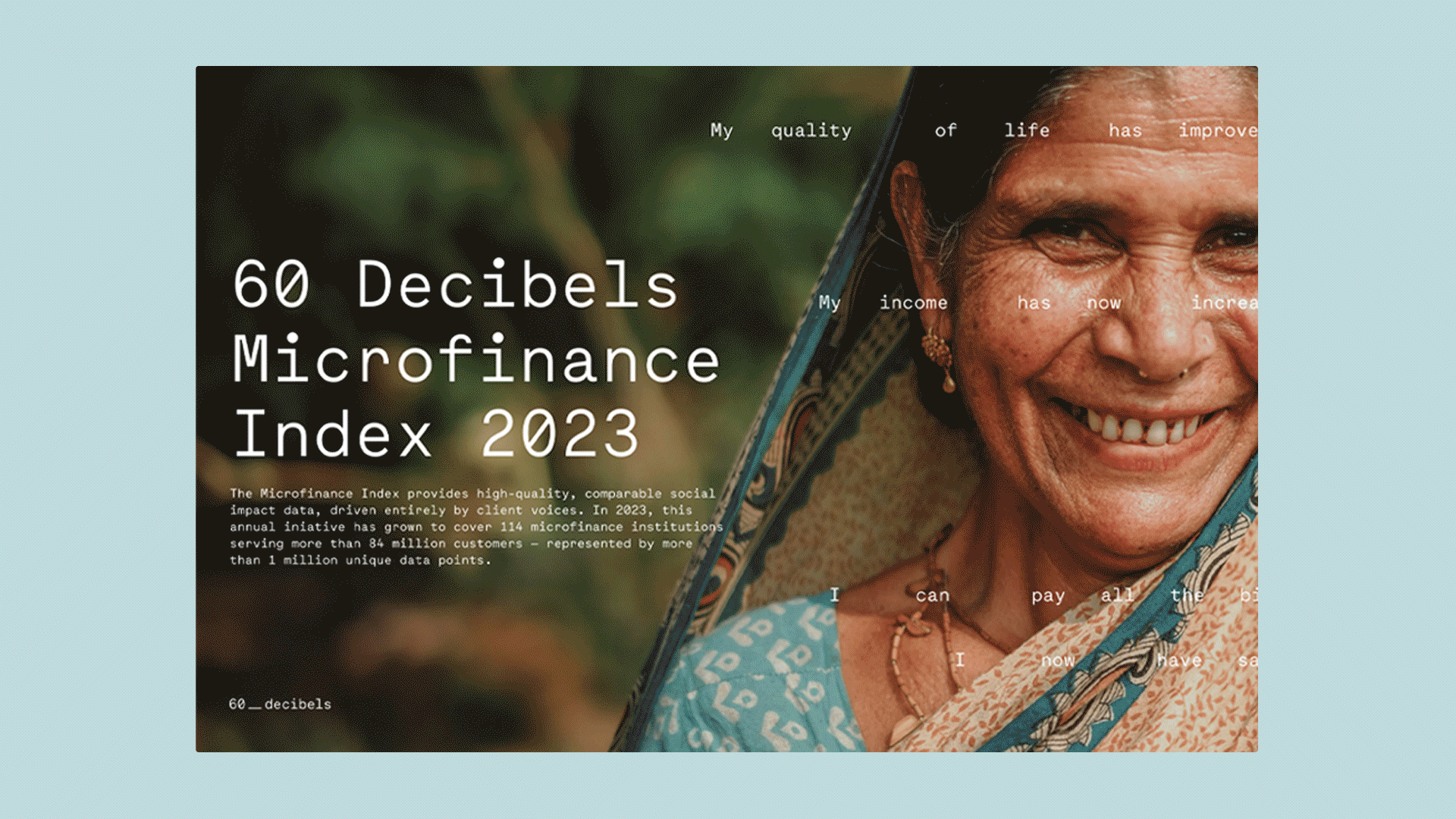
Insights from three top-performing financial service providers
The Microfinance Index is a global financial inclusion benchmark that provides high-quality, comparable impact data for the microfinance industry, driven entirely by client voices. This annual initiative has expanded to collect more than one million unique global data points in 2023.
What factors contribute to top performance – as told by three 2023 Social Impact awardees
Every year as part of the Microfinance Index, we are asked “What does good performance look like for a financial service provider?” and “what should we be aiming to achieve?”
We spoke to a selection of our 2023 MFI Index Social Impact awardees, and asked each to share some insight on the following question: in your opinion, what are some key factors that have contributed to your organization being ranked as a top performer?
Here’s what leaders within Kenya Women Microfinance Bank, MicroLoan Foundation Zambia, and Svasti Microfinance shared with us.

Mwangi Githaiga, Managing Director – Kenya Women Microfinance Bank (KWFT)
As an organization, we are focused on economically empowering women and their families. As part of this mission, we offer free financial literacy training alongside imparting basic business management skills to ensure that once customers receive working capital from KWFT, they are able to run their businesses sustainably and thrive in terms of increased incomes and assets base.
We take great pride in developing customer-centric products that positively transform the lives of our customers and their families. We’re committed to developing innovative and affordable products and services that are aimed at improving our customers and their families’ livelihoods by upholding their dignity, saving them time and energy, conserving the environment as well as earning them income.
Through financial literacy training, KWFT has enabled women to progressively embrace a disciplined savings culture that enables its customers to plan for future financial goals. We have worked hard to develop attractive and competitive savings products that suit the needs of our customers at different stages in their lives.
Jack Ngoma, CEO – MicroLoan Foundation Zambia
Financial literacy and business training are essential to ensuring our clients’ success. All clients access five pre-disbursement training sessions to strengthen their financial literacy and once they have received their loan, the Loan and Training Officers deliver ongoing business training throughout the loan cycle. The institution’s training methodology is designed for women with low literacy levels and is delivered through dance, song, and role play.
Our field staff go through rigorous training to ensure that they adhere to ethical lending practices and are confident in providing in-depth training and support for clients. The high-touch model builds a relationship of trust between the field staff and the clients. Together, they are able to make informed decisions on appropriate loan sizes to prevent over-indebtedness.
MicroLoan Foundation’s model is designed to specifically address female clients’ needs. The self-governing loan groups are organised into centres where the women take charge of their own learning. The model builds a sense of ownership and helps women overcome a lack of trust in financial institutions, fear of over-indebtedness, and confidence in their own ability to take charge of their finances, manage a business and contribute to household income.
Arunkumar Padmanabhan, Cofounder & CEO – Svasti Microfinance
Svasti provides loans to women from low-income households and encourages them to use the amount for productive purposes. When our clients are able to invest loans in their businesses, they are able to grow their businesses or diversify their livelihoods – which can potentially increase their overall household income. Increased incomes provide opportunities for our clients to invest in children’s education and help improve the quality of meals.
We provide products which support clients with their health outcomes, for example, WASH loans that aim to provide access to good quality drinking water and build sanitation facilities. We also offer a voluntary hospicash product which helps clients or their spouses to get daily cash benefits in case of hospitalization, which compensates for loss of wages during this period.

Financial service providers play a key role in promoting financial inclusion in underserved communities. They are often embedded in communities and have built deep relations of trust with their clients. As the above insights demonstrate, they are uniquely positioned to increase financial resilience, help families withstand economic shocks, grow businesses, improve household well-being, and empower women.
Out of the 114 financial service providers (FSPs) surveyed in 2023, 60 Decibels recognized nine Social Impact Awardees, who ranked in the top three for their region across six key dimensions in the Index: Access, Business Impact, Household Impact, Client Protection, Resilience and Agency. Each dimension is made up of 2-5 indicators as detailed below.
-
Access
Measures the degree to which the financial service providers are serving a previously undeserved population, the competitive landscape the financial service providers operate in, and the degree to which they are serving less well-off clients.
Indicators
- First Access: Clients accessing a loan for the first time
- Alternatives: Clients without access to good alternatives
- Inclusivity Ratio
-
Business Impact
Measures the impact the financial service providers have on clients’ ability to earn income from their business and their ability to employ others.
Indicators
- Employment: Increased number of paid employees
- Income: Very much increased business income
-
Household Impact
Measures the impact the financial service providers have on clients’ quality of life and their ability to invest or cover household expenditures.
Indicators
- Quality of Life: Very much improved quality of life
- Home Improvement: Very much increased spending on home improvements, education, healthcare and quality meals
-
Client Protection
Measures the degree to which clients are informed of the financial service provider’s loan conditions prior to borrowing, and the ability of clients to make repayments without reducing other household consumption.
Indicators
- Loan Understanding: Clients who strongly agree they understand terms and conditions of loan
- Financial Stress: Very much decreased time spent worry about finances
- Repayment Burden: Clients saying their loan repayments are not a burden
- Consumption Sacrifice: Clients who never reduce food consumption to meet repayment
- Unexpected Fee: Clients saying they have never experienced an unexpected fee or charge
-
Resilience
Measures the degree to which clients are financially prepared for an unforeseen economic shock, and the impact the financial service providers have on this preparedness. It also measures the client’s ability to manage finances and save.
Indicators
- Savings: Clients whose savings balance has very much increased
- Role in Resilience: Clients who say very much improved resilience because of the FSP
- Financial Management:Very much improved ability to manage finances
-
Agency
Measures the impact the financial service providers have on clients’ confidence, ability to make decisions about their money, and contributions to clients’ ability to achieve their financial goals.
Indicators
- Decision-making: Clients who say their ability to make decisions related to their finances have very much increased
- Confidence: Clients who say their confidence has very much increased
- Financial Goals: Very much improved ability to achieve a financial goal
Our standard survey gathers data for each of these indicators from a representative sample of clients at each financial service provider. Find out more about how we calculate the rankings for the Microfinance Index and Social Impact Awardees here.
Discover more about the work of all 114 financial service providers surveyed in the 2023 Microfinance Index by downloading the full report here.